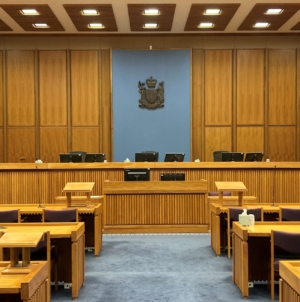-
Gulyás: Hungarian government has withdrawn its ICC membership - 4 mins ago
-
Donald Trump Reveals $5m Visa Gold Card With His Face On - 7 mins ago
-
Eric Dixon’s second-half scoring barrage leads Villanova past USC, into semifinals - 33 mins ago
-
MEPs: EP’s grand coalition with backing from Tisza and DK voted to continue the war - 40 mins ago
-
Donald Trump Issues Update on Elon Musk Leaving DOGE - 46 mins ago
-
‘Battlestar Galactica’ star calls show’s AI warning more relevant than ever - 56 mins ago
-
Government launches info campaign on upcoming referendum on Ukraine’s EU admission - about 1 hour ago
-
Villanova Wildcats vs. USC Trojans The Crown Highlights | FOX College Hoops - about 1 hour ago
-
Ford Is Now Offering Buyers Its Employee Pricing Amid Trump Tariffs - about 1 hour ago
-
PM’s Political Director: Strong families are key to a strong country - 2 hours ago
US Bans Sex Between Personnel and Chinese Citizens in China: Report
The U.S. government has enacted a sweeping ban on romantic or sexual relationships between American government personnel and Chinese citizens in China, an unprecedented move not seen publicly since the Cold War, The Associated Press reported.
Four individuals with direct knowledge of the new rules confirmed to the AP that the policy took effect in January, shortly before U.S. Ambassador Nicholas Burns left his post in Beijing. It applies to all American diplomatic staff, family members, and contractors with security clearances stationed at U.S. facilities in mainland China and Hong Kong.
The directive expands on a more limited policy put in place last summer that barred relationships between U.S. personnel and Chinese support staff such as guards. The broadened rule prohibits intimate relationships with any Chinese national while in China, the AP reported.
Newsweek has contacted the U.S. Embassy in Beijing for comment. The State Department said it does not comment on internal matters.
Burns, now vice chair at the consultancy The Cohen Group, did not respond to AP’s request for comment.
AP Photo/Mark Schiefelbein, File
Why It Matters
The policy reflects intensifying concerns in Washington over espionage and influence operations tied to China’s intelligence services. It revives Cold War-era restrictions once common during U.S.-Soviet tensions, signaling a return to heightened vigilance against foreign recruitment tactics.
Though some agencies have historically required disclosure of intimate relationships in high-risk postings, a categorical non-fraternization order in a country as geopolitically significant as China marks a rare step.
The directive also demonstrates growing unease among lawmakers. Two sources told AP the idea gained traction after members of Congress urged stricter rules, citing espionage vulnerabilities. The House Select Committee on the Chinese Communist Party declined to comment.
What To Know
The policy applies to all U.S. diplomatic missions in mainland China—including Beijing, Guangzhou, Shanghai, Shenyang, and Wuhan—as well as the consulate in Hong Kong. It does not cover personnel stationed outside Chinese territory.
Anyone with a pre-existing relationship with a Chinese citizen may seek an exemption. Denied applications mean ending the relationship or vacating the assignment. Violators face immediate expulsion from China, sources said.
Details of what constitutes a “romantic or sexual relationship” were not disclosed, and the policy has not been published or formally announced.
What People Are Saying
The State Department declined to address the matter, and the National Security Council referred questions back to the department. The AP reported that Ambassador Burns implemented the rule days before President Donald Trump’s departure from office in January.
Diplomatic and intelligence officials long stationed in China said honeypot tactics—seduction schemes used for espionage—remain a known strategy for Beijing. Incoming U.S. staff routinely receive security briefings with case studies highlighting efforts by Chinese intelligence to entrap American personnel.
During the Cold War, a similar ban was imposed in 1987 after a U.S. Marine in Moscow was compromised by a Soviet operative. Those restrictions were relaxed after the collapse of the Soviet Union in 1991.
What’s Next
It remains unclear whether other high-risk U.S. postings will follow suit or whether the China directive represents a unique escalation. Existing non-fraternization policies elsewhere remain classified.
Without official acknowledgment, enforcement and implications of the China-specific policy are likely to draw scrutiny from diplomatic personnel and civil liberties advocates alike, particularly if additional countries are added under similar bans.
This article includes reporting from The Associated Press.
Source link






























